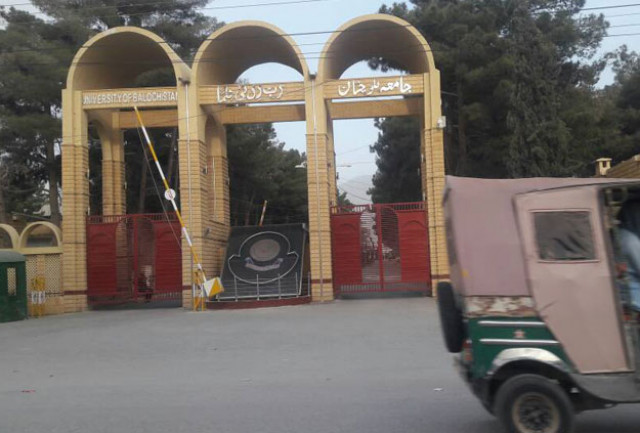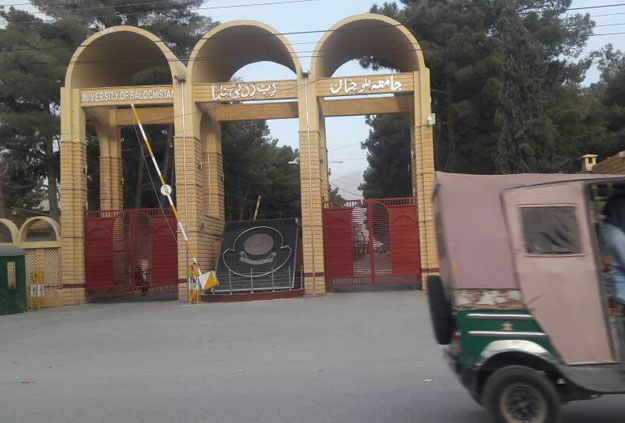At Balochistan's universities, social sciences are far from being a priority
Teaching the next generation of social scientists in the province will be a huge investment

University of Balochistan. PHOTO: HIZBULLAH KHAN
Very few academic institutions in the country offer courses in social sciences that deal with understanding extremism, terrorism, violence and conflict resolution. Surprisingly, the condition is even worse in Balochistan – Pakistan’s insurgency-hit province.
Big push required to improve education in Balochistan
With the help of social science programmes, academic institutions tend to solve issues challenging any society through new ideas and meeting future goals. In Balochistan, where not many universities are offering social science disciplines, extremely talented students have slim options to pick a major and play positive roles in their society.
According to the Council of Social Sciences Pakistan – a non-profit and autonomous body of social scientists in Pakistan – at least 25 social science disciplines are currently being taught in the country. Nevertheless, the official pages of universities in Balochistan present a different story.
 University of Balochistan. PHOTO: Hizbullah Khan
University of Balochistan. PHOTO: Hizbullah KhanThe University of Balochistan has only 16 social science disciplines, the Sardar Bahadur Khan Women's University has eight, and the Balochistan University of Information Technology, Engineering and Management Sciences has four. The number is even low at the University of Turbat, the Lasbela University of Agriculture, Water and Marine Sciences and the University of Loralai. Remarkably, the Balochistan University of Engineering and Technology Khuzdar does not even have a social science department.
Students with an eye on their job prospects should take social science degrees, research suggests, as the subject plays a key role when it comes to addressing social challenges.
“Several issues exist in the societies where there are fewer social scientists or where they play a weak role when it comes to societal policies," says Abdul Rehman, the chairperson of the Sociology Department at the University of Balochistan.
"One of the many reasons why Balochistan is surrounded by problems including lawlessness is the lack of social science departments at university levels. Very few people are familiar with the benefits of the subject,” he explains.
"A society always suffers due to a lack of social science disciplines and social scientists."
The chairperson elaborated that extremism and terrorism were not the issues of the United States, France, and England. "These are the issues of societies where people don't give importance to social sciences,” he claims.
The subject, generally believed to be crucial for a modern and stable society, also resolves societal problems through scientific reasoning.
University of Balochistan students reject security forces presence
“A lack of knowledge of social sciences can be dangerous because they are the study of culture, society and peoples’ relationships. They have a direct impact on the lives of people,” says Zahoor Ahmed Lehri, a lecturer at the University of Balochistan 's Sociology Department.
Not many women in Balochistan opt for a career in social sciences because unlike other parts of the country, the subject is not considered suitable for women in the province. This is the reason why the number of female students in its disciplines is less as compared with other department including natural and management sciences.
 Students of the University of Balochistan address a press conference at the Quetta Press Club. PHOTO: Online
Students of the University of Balochistan address a press conference at the Quetta Press Club. PHOTO: Online“Gender biases [in Balochistan] has promoted a concept that women should not pursue careers in social science. These stereotypes have deep effects on women’s lives,” says a lecturer at the Sardar Bahadur Khan Women's University requesting anonymity.
According to her, men cannot fill the vacuum left by women, no matter which society they belong to, because some tasks that they can perform, no men can do.
The social science lecturer estimates that only eight to 10 per cent women are choosing social science disciplines as their major subjects - the reason why about 90 per cent social science scholars and researchers in Balochistan are men. These male researchers often fail to focus on women's issues in their research papers.
Baloch female students boycott examinations over 'frisking' by male invigilators
Due to cultural taboos and religious restrictions in the province, a majority of the families do not allow female students to enroll in mixed-gender universities.
The only university for women (the Sardar Bahadur Khan Women's University) in the entire Balochistan - a province that constitutes approximately 44 per cent of Pakistan - only has a few social science disciplines.
“Many female students who are interested in social science disciplines find little opportunities because the only women university [in the province] has not enough disciplines and so, they are compelled to select other subjects with limited interest,” added the lecturer.
 Teaching the next generation of social scientists in the province will be a huge investment. PHOTO: APP
Teaching the next generation of social scientists in the province will be a huge investment. PHOTO: APPRabia, a student of English at the Sardar Bahadur Khan Women's University, wished to study political science as her major, but the university had no political science department and she was not allowed to enroll in the University of Balochistan.
“Finally, I had to select English to make sure that my career continues,” she shared while recalling what she had to go through.
The troubled situation in the province has further negatively impacted social science disciplines in recent years. A large number of highly skilled and learned faculty members, researchers and scholars have left Balochistan.
Turbat University to launch law programme
The Human Rights Commission of Pakistan in its annual report for the year 2015 revealed that over 70 of 100 PhD faculty members from varying Balochistan universities shifted to other parts of the country because of financial and security reasons during the year.
The chairperson of the University of Balochistan's Sociology Department says that 90 per cent faculty members who were from Punjab, Sindh and Khyber-Pakhtunkhwa (K-P) have left the university.
A number of MPhil and PhD classes of social sciences have not even started yet because of the lack of qualified teachers.
“The space left by the teaching staff [in Balochistan] may take many years to fill,” he maintains.
Many social scientists and students complain that the provincial government has been giving priority to natural, management, business and engineering disciplines over social sciences.
 A security official stands outside the SBK Women's University. PHOTO: Express
A security official stands outside the SBK Women's University. PHOTO: ExpressSocial science research promotes national understanding and resolves issues that are essential to social stability, progress and the issues of national interest.
According to Rehman, 60 per cent students in Balochistan universities come from rural areas,with limited academic background. Without teachers' guidance, they are unable to conduct proper research reports on cultural, social, and economic matters. Moreover, several topics that they find interesting are controversial, making them hesitant.
“The students belong to numerous volatile areas and owing to the precarious situation of Balochistan many of them avoid several issues,” explains Lehri.
Turbat University to launch law programme
Khalid Khan, an MPhil social science student at the University of Balochistan also agrees that every major social issue is problematic for the students in the province including evolution, ethnicity, conflict, extremism and sex. “As a result, most of the students are selecting common topics for research including youth issues, democracy, civil society, urbanisation and citizenship,” he adds.
“The experts of social sciences have little space in print media and few newspapers contain material on social sciences. Print media should provide more space for social science experts and increase content because many columnists and analysts don't analyse issues from this perspective,” claims Khan.
It is hard to believe that why the significance of social sciences and, for that matter, its graduates are being undermined in Balochistan, which direly needs to benefit from them.
Nevertheless, teaching and training the next generation of social scientists in the province will be a profitable investment that will repay itself many times over. It can be only hoped that the federal and provincial governments will pay attention in bringing that revolution in Balochistan.
Hizbullah Khan is a freelance investigative journalist.



















COMMENTS
Comments are moderated and generally will be posted if they are on-topic and not abusive.
For more information, please see our Comments FAQ